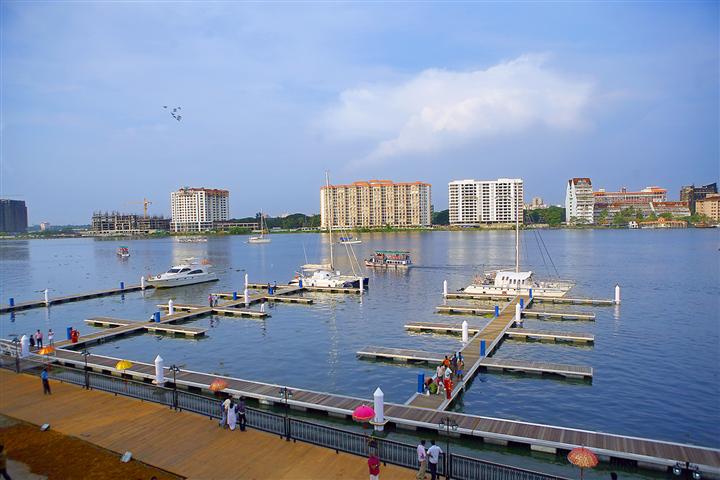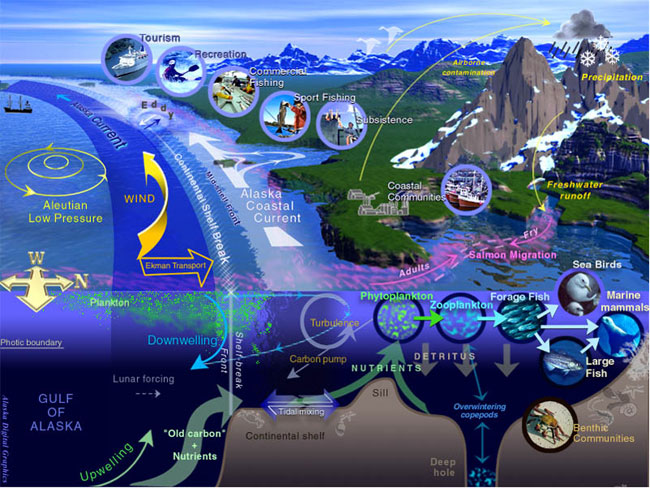|
Central Marine Fisheries Research Institute
The Central Marine Fisheries Research Institute was established in the government of India on 3 February 1947 under the Ministry of Agriculture and Farmers Welfare and later, in 1967, it joined the Indian Council of Agricultural Research (ICAR) family and emerged as a leading tropical marine fisheries research institute in the world. The Headquarters of the ICAR-CMFRI is located in Kochi, Kerala. Initially the institute focused its research efforts on creating a strong database on marine fisheries sector by developing scientific methodologies for estimating the marine fish landings and effort inputs, taxonomy of marine organisms and the biological aspects of the exploited stocks of finfish and shellfish on which fisheries management were to be based. This focus contributed significantly to development of the marine fisheries sector from a predominantly artisanal, sustenance fishery till the early sixties to that of a complex, multi-gear, multi-species fisheries. One of the majo ... [...More Info...] [...Related Items...] OR: [Wikipedia] [Google] [Baidu] |
Indian Council Of Agricultural Research
The Indian Council of Agricultural Research (ICAR) is an autonomous body responsible for co-ordinating agricultural education and research in India. It reports to the Department of Agricultural Research and Education, Ministry of Agriculture. The Union Minister of Agriculture serves as its president. It is the largest network of agricultural research and education institutes in the world.''India 2016'', "Agriculture" p.93, Ministry of Information and Broadcasting, (New Delhi). The committee to Advise on Renovation and Rejuvenation of Higher Education (Yashpal Committee, 2009) has recommended setting up of a constitutional body – the National Commission for Higher Education and Research – which would be a unified supreme body to regulate all branches of higher education including agricultural education. Presently, regulation of agricultural education is the mandate of ICAR, Veterinary Council of India (Veterinary sub-discipline) and Indian Council of Forestry Research and Educ ... [...More Info...] [...Related Items...] OR: [Wikipedia] [Google] [Baidu] |
Ernakulam
Ernakulam () is the Central Business District of the city of Kochi in Kerala, India and has lent its name to the Ernakulam district. Many major establishments, including the Kerala High Court, the office of the Kochi Municipal Corporation and the Cochin Shipyard are situated here. History Classical history The region can claim to have played a significant part in fostering the trade relations between Kerala and the outside world in the ancient and medieval period. The early political history of Ernakulam is interlinked with that of the Chera Dynasty of the Sangam age, who ruled over vast portions of Kerala and Tamil Nadu. After the Cheras, the place was later ruled by the Kingdom of Cochin (Perumpadapu Swaroopam). Princely State of Cochin Although under British suzerainty (specifically the East India Company) since the Anglo-Dutch Treaty of 1814, Rama Varma XII of the Kingdom of Cochin moved his capital from Mattancherry to Tripunithura in about 1840. Fort Cochin Munic ... [...More Info...] [...Related Items...] OR: [Wikipedia] [Google] [Baidu] |
Marine Stewardship Council
The Marine Stewardship Council (MSC) is a non-profit organization which aims to set standards for sustainable fishing. Fisheries that wish to demonstrate they are well-managed and sustainable compared to the MSC's standards are assessed by a team of Conformity Assessment Bodies (CABs). The mission of the MSC is to use its ecolabel, for which the MSC receives royalties for licensing it to products, and fishery certification program to recognise and reward sustainable fishing practices. The MSC has faced criticism in the past, mainly centering on its close ties to the fishing industry and conflict of interest stemming from royalties received by the industry for its certification label. Contribution to changes in the oceans When buyers choose MSC-certified fish, well-managed fisheries are rewarded for sustainable practices. In turn, the growing market for certified sustainable seafood generates a powerful incentive for other fisheries to demonstrate they are fishing sustainabl ... [...More Info...] [...Related Items...] OR: [Wikipedia] [Google] [Baidu] |
NITI Aayog
The NITI Aayog (; abbreviation for National Institution for Transforming India) serves as the apex public policy think tank of the Government of India, and the nodal agency tasked with catalyzing economic development, and fostering cooperative federalism through the involvement of State Governments of India in the economic policy-making process using a bottom-up approach. Its initiatives include "15-year road map", "7-year vision, strategy, and action plan", AMRUT, Digital India, Atal Innovation Mission, Medical Education Reform, agriculture reforms (Model Land Leasing Law, Reforms of the Agricultural Produce Marketing Committee Act, Agricultural Marketing and Farmer Friendly Reforms Index for ranking states), Indices Measuring States’ Performance in Health, Education and Water Management, Sub-Group of Chief Ministers on Rationalization of Centrally Sponsored Schemes, Sub-Group of Chief Ministers on Swachh Bharat Abhiyan, Sub-Group of Chief Ministers on Skill Development, Ta ... [...More Info...] [...Related Items...] OR: [Wikipedia] [Google] [Baidu] |
Govt
A government is the system or group of people governing an organized community, generally a state. In the case of its broad associative definition, government normally consists of legislature, executive, and judiciary. Government is a means by which organizational policies are enforced, as well as a mechanism for determining policy. In many countries, the government has a kind of constitution, a statement of its governing principles and philosophy. While all types of organizations have governance, the term ''government'' is often used more specifically to refer to the approximately 200 independent national governments and subsidiary organizations. The major types of political systems in the modern era are democracies, monarchies, and authoritarian and totalitarian regimes. Historically prevalent forms of government include monarchy, aristocracy, timocracy, oligarchy, democracy, theocracy, and Tyrant, tyranny. These forms are not always mutually exclusive, and mixed ... [...More Info...] [...Related Items...] OR: [Wikipedia] [Google] [Baidu] |
Government Of Kerala
Government of Kerala is the subnational government of the Indian state of Kerala. The government is led by a chief minister, who selects all the other ministers. The chief minister and their most senior ministers belong to the supreme decision-making committee, known as the cabinet. Ministers of the Kerala Government are responsible to the Kerala Legislative Assembly; they make statements in the assembly and take questions from members of the assembly. The government is dependent on Kerala Legislative Assembly to make primary legislation. Legislative assembly elections are held every five years to elect a new assembly, unless there is a successful vote of no confidence in the government or a two-thirds vote for a snap election in the assembly, in which case an election may be held sooner. After an election, the governor selects as chief minister the leader of the party most likely to command the confidence of the assembly, usually by possessing a majority of MLAs. Under the ... [...More Info...] [...Related Items...] OR: [Wikipedia] [Google] [Baidu] |
Overfishing
Overfishing is the removal of a species of fish (i.e. fishing) from a body of water at a rate greater than that the species can replenish its population naturally (i.e. the overexploitation of the fishery's existing fish stock), resulting in the species becoming increasingly underpopulated in that area. Overfishing can occur in water bodies of any sizes, such as ponds, wetlands, rivers, lakes or oceans, and can result in resource depletion, reduced biological growth rates and low biomass levels. Sustained overfishing can lead to critical depensation, where the fish population is no longer able to sustain itself. Some forms of overfishing, such as the overfishing of sharks, has led to the upset of entire marine ecosystems. Types of overfishing include: growth overfishing, recruitment overfishing, ecosystem overfishing. The ability of a fishery to recover from overfishing depends on whether its overall carrying capacity and the variety of ecological conditions are suitable for t ... [...More Info...] [...Related Items...] OR: [Wikipedia] [Google] [Baidu] |
Food And Agriculture Organization
The Food and Agriculture Organization of the United Nations (FAO)french: link=no, Organisation des Nations unies pour l'alimentation et l'agriculture; it, Organizzazione delle Nazioni Unite per l'Alimentazione e l'Agricoltura is an international organization that leads international efforts to defeat hunger and improve nutrition and food security. Its Latin motto, ', translates to "let there be bread". It was founded on 16 October 1945. The FAO is composed of 195 members (including 194 countries and the European Union). Their headquarters is in Rome, Italy, and the FAO maintains regional and field offices around the world, operating in over 130 countries. It helps governments and development agencies coordinate their activities to improve and develop agriculture, forestry, fisheries, and land and water resources. It also conducts research, provides technical assistance to projects, operates educational and training programs, and collects data on agricultural output, produ ... [...More Info...] [...Related Items...] OR: [Wikipedia] [Google] [Baidu] |
Marine Biodiversity
Marine life, sea life, or ocean life is the plants, animals and other organisms that live in the salt water of seas or oceans, or the brackish water of coastal estuaries. At a fundamental level, marine life affects the nature of the planet. Marine organisms, mostly microorganisms, produce oxygen and sequester carbon. Marine life in part shape and protect shorelines, and some marine organisms even help create new land (e.g. coral building reefs). Most life forms evolved initially in marine habitats. By volume, oceans provide about 90% of the living space on the planet. The earliest vertebrates appeared in the form of fish, which live exclusively in water. Some of these evolved into amphibians, which spend portions of their lives in water and portions on land. One group of amphibians evolved into reptiles and mammals and a few subsets of each returned to the ocean as sea snakes, sea turtles, seals, manatees, and whales. Plant forms such as kelp and other algae grow in the wate ... [...More Info...] [...Related Items...] OR: [Wikipedia] [Google] [Baidu] |
Mariculture
Mariculture or marine farming is a specialized branch of aquaculture (which includes freshwater aquaculture) involving the cultivation of marine organisms for food and other animal products, in enclosed sections of the open ocean ( offshore mariculture), fish farms built on littoral waters ( inshore mariculture), or in artificial tanks, ponds or raceways which are filled with seawater ( onshore mariculture). An example of the latter is the farming of marine fish, including finfish and shellfish like prawns, or oysters and seaweed in saltwater ponds. Non-food products produced by mariculture include: fish meal, nutrient agar, jewellery (e.g. cultured pearls), and cosmetics. Methods Algae Shellfish Similar to algae cultivation, shellfish can be farmed in multiple ways: on ropes, in bags or cages, or directly on (or within) the intertidal substrate. Shellfish mariculture does not require feed or fertilizer inputs, nor insecticides or antibiotics, making shellfish aquacult ... [...More Info...] [...Related Items...] OR: [Wikipedia] [Google] [Baidu] |
Sustainable Fishery
A conventional idea of a sustainable fishery is that it is one that is harvested at a sustainable rate, where the fish population does not decline over time because of fishing practices. Sustainability in fisheries combines theoretical disciplines, such as the population dynamics of fisheries, with practical strategies, such as avoiding overfishing through techniques such as individual fishing quotas, curtailing destructive and illegal fishing practices by lobbying for appropriate law and policy, setting up protected areas, restoring collapsed fisheries, incorporating all externalities involved in harvesting marine ecosystems into fishery economics, educating stakeholders and the wider public, and developing independent certification programs. Some primary concerns around sustainability are that heavy fishing pressures, such as overexploitation and growth or recruitment overfishing, will result in the loss of significant potential yield; that stock structure will erode ... [...More Info...] [...Related Items...] OR: [Wikipedia] [Google] [Baidu] |






